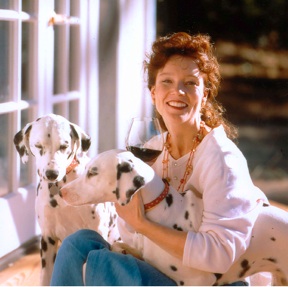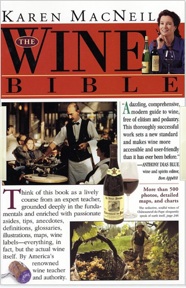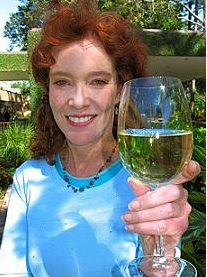The Karen MacNeil Interview
 There are few "wine personalities" that have earned national fame here in America. You can probably count them on the fingers of one hand. Karen MacNeil would lay claim to one of those digits.
There are few "wine personalities" that have earned national fame here in America. You can probably count them on the fingers of one hand. Karen MacNeil would lay claim to one of those digits.
It takes quite a few paragraphs to outline her accomplishments and accolades. But let's not allow that to stop us. Karen is probably most famous for writing one of the most important wine books of the past 20 years. "The Wine Bible", published in 2001 is a 900 page primer on all things wine that has played a crucial role in educating hundreds of thousands of wine lovers. She is also the author of "Wine, Food, Friends: Karen's Wine & Food Pairing Guide", as well as the host of an Emmy award-winning PBS series based on the book. She is the creator and Chairman of the Rudd Center for Professional Wine Studies at the
Culinary Institute of America in the Napa Valley, a multi-million
dollar wine center has been called the "Harvard of wine education."
Karen has been honored by the James Beard Foundation, the European Wine Council, The Wine Appreciation Guild, The International Wine & Spirits Competition and was named America's "Missionary of the Vine" by Time Magazine.
And she has also, now, been interviewed here at FERMENTATION: The Daily Wine Blog.
Karen's new website, particularly its "Wine-Style-Food" section is treasure trove not only of her services but of serious and fun wine knowledge. It was after looking over that website that I reached out to ask her if she would answer a few questions for FERMENTATION readers. She was kind enough to do so.
1. You've been writing about wine for nearly 30 years. First, tell me how you became a wine writer and what's changed most for wine writers from the time you started and today.
How I became a wine writer is a long story that usually gets told over at least one good bottle of wine. But in short, my goal as a young woman (starting at about age 15) was to understand the entire world of gastronomy—not only food, but the history of eating, dining behavior, the advent of manners, drinking behaviors, patterns of historical consumption, how food and beverages were woven into the fabric of culture, and so on. I started studying food; began writing about it (first article published in the Village Voice when I was 19), then began the long road of studying wine. Eventually after 8 years of self study (there were no wine classes back then), I got up the nerve to write my first article on wine.
What’s changed since then?
a. A LOT more women in the business.
b. The “shedding” of what I call the “British school;” in favor of a more “American” approach to wine
c. Many more New World wineries, wine regions, New World ways of thinking about wine
d. Wine language is also beginning to change
2. Has everything there is to say about wine been said? That is, is it possible for a writer to find a new angle or hook upon which to hang their writings and commentary?
Everything said already? Some days, I think we’ve only just BEGUN to say what needs to be or can be said. I don’t think American wine writing has yet fully blossomed. I also think we wine writers should be working a lot harder at forging the new “language” of wine.
3. While the public seems to have happily embraced the 100 point wine rating system, there are still a great many in the wine industry who see it as corrupting the complexity of wine. What are your thoughts on this controversy?
The 100 pt system has opened so many doors and created huge excitement. There are entire wine regions that have been discovered because an obscure wine received a high score. On the other hand, we all know the cracks in the system and the intellectual problems inherent in it. I, for one, can not say that the 100 pt system is categorically good or categorically bad
4. You recently launched a new website that is very accessible and also very heavy on delivering content primarily and promotional info on your consulting services secondarily. What are your expectations for the new www.karenmacneil.com?
Expectations. We are a small company but we like to take on meaty projects. I personally love to create things from scratch—especially things that had no model (the Wine Bible and the CIA Rudd Center for Professional Wine Studies are examples). So, we hope to work in many facets of the industry doing what we do best: education with a capital E; creative positioning and communications (needless to say I’m a writer at heart); AND conducting high level wine experiences for corporations and companies throughout America. Wine bonds people. It’s a perfect way for corporations to establish loyalty..either internally or with clients.
5. You have worked in one way or another with all the most important wine personalities over the past 20 years. Have you ever been star struck any anyone's presence?
Great question. I was pretty intimidated by Michael Broadbent when I first met him. Hugh Johnson left me speechless because he is so disarmingly erudite yet gentle. The first time I met Bob Parker (now a friend) was maybe 20 years ago when we tasted 120 German rieslings—just the 2 of us. I was glad there was so much wine to concentrate on because I didn’t know what to say to him.
6. By my count, there are upwards of 700+ wine blogs on the Internet today. Most are written by wine lovers. Some are written by members of the wine Industry. A small percent are written by writing pros. Can you give any advice to the vast majority of bloggers—those who are wine lovers and who want to make a name for themselves through wine blogging?
Get better at wine. This sounds severe, I know. But one doesn’t become an expert because one has a blog. It takes years of study and experience to know wine well. I honestly believe too many bloggers feel (or behave) as though they can ju st skip the step of becoming REALLY grounded in the academics of wine. Even if one blogs for basic consumers, it’s important to know one’s stuff inside and out. At this moment in time, few bloggers do
st skip the step of becoming REALLY grounded in the academics of wine. Even if one blogs for basic consumers, it’s important to know one’s stuff inside and out. At this moment in time, few bloggers do
7. You've produced and been featured in television series. You've may be among the most read wine writers in America. You've educated and entertained thousands at company events and seminars. You founded the professional wine studies department at the CIA in Napa. You've written books read by millions. What do you count as your greatest accomplishment in your career as a wine educator?
That’s a hard question. But I think it would be: developing a new style of writing and communicating about wine. I believe the Wine Bible has sold a half million copies because it has a distinct “voice”—a way of explaining the world of wine that is different than most wine writing today. I think my seminars for corporations are pretty successful because they look at wine through a very different lens…..As I move into my own next decade, this is the area that excites me most. I think the culture of wine in America can be vastly expanded…we just have to figure out how to better communicate one of life’s greatest everyday pleasures.
Karen MacNeil lives in Napa. You can sign up for her newsletter to keep up to date on one of America's most important wine educators is doing.

Ms. MacNeil said:
“It takes years of study and experience to know wine well. I honestly believe too many bloggers feel (or behave) as though they can just skip the step of becoming REALLY grounded in the academics of wine.”
Yes, and thanks for saying it.
The Wine Bible was the first wine book I ever picked up. I still use it today, and I often recommend it to others, especially those who are just starting out and show a passion for wanting to know more about wine. Similarly, I attended one of Ms. MacNeil’s classes on Champagned at the CIA Rudd Center a few years back and I still reference my notes on that one. I feel like a owe a good chunk of my foundational wine education to her in some way — an incredibly deep resource.
To both Toms. That quote from Ms. MacNeil is completely self serving, of course, or on another level banal. Bloggers should find their own voice or whatever other cliché one wants to use about wine writing. Because wine has so many dimensions it allows so many different approaches.
Yes, it takes years to become an “expert” on wine, but maybe you should know more about history or sociology or travel writing. Or just hang out with those in the industry. Being steeped in wine information is not necessary to bring most aspects of the subject alive. Indeed, a case can be made that it deadens interest. The enjoyment of wine is not an educational/intellectual pursuit. It is sensuous experience and all the CIA classes underwritten by corporations or coming out of your own diminished pocket boook won’t really make a real difference in that enjoyment.
Tom Merle,
It escapes me how cognizant people can explain away the wine profession as merely a sensuous experience.
You confuse knowledge with sipping.
I give Karen mad props for not throwing me out of the CIA earlier this year. I also totally agree with her that more wine writers need better wine chops (I’ve long been an advocate of writers going for certifications like CSW and WSET). I’d add though that this is not specific to wine bloggers – it applies to wine writers in general.
Can’t for the life of me figure out what “basic consumers” are though :-).
WineDude,
I’m with you on that–don’t know if it ought to be a WST or CSW, but it ought to be a certificate of some sort to show that writers offering ratings, reviews, and opinions have been trained to offer knowledgeable ratings, reviews and opinions.
A basic consumer is one with two arms, two legs, a torso, a head, and a wallet.
WSET–sorry.
Thomas – BEST definition of “basic consumer” that I’m ever likely to see! 🙂
Just want to add a bit to my point on the Certifications: I don’t mean that anyone who wants to blog or otherwise write/journal about wine needs a cert. What I mean is anyone who is writing about wine and wants their writing to exist with any modicum of authority either needs some sort of cred., and Certs. are a great way to build up some of that because the ‘big 3’ certs (WSET, Society of Wine Educators, Court of Master Somms) are all respected enough to provide that. Not a substitute for experience, but shows that you have a solid foundation to know what you’re writing about.
Cheers!
Karen MacNeil’s book was the first serious wine book i picked up. Read it cover to cover. It is all beautiful to me, and is a constant companion when writing or even just talking about wine.
I’d agree, weather your a wine writer/blogger or just a consumer, it is important to be “better at wine”. I take it to mean, don’t be lazy; go through the effort of digging through the misinformation till you get it right. It should be about substance. It reminds me of a simple piece of advice i was told when getting into photography: “Focus, f•••ers.”
Did she never learn how one holds a glass of white?
Thanks for the update on Ms. Karen! I remember watching her Wine, Food and Friends PBS series years ago, and wish she would do another series (ever notice how rarely wine is profiled on the Food Cable Channels?)
Did she mention anything about a possible Wine Bible 2?
Off topic, I know, but sometimes I get the CIA (the wine one) mixed up with COPIA. Does anyone have an update on the status of COPIA, is it feasible that the CIA could buy it?